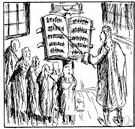can·tor
(kăn′tər)n.
1. The Jewish religious official who leads the musical part of a service.
2. The person who leads a church choir or congregation in singing; a precentor.
can·to′ri·al (kăn-tôr′ē-əl, -tŏr′-) adj.
American Heritage® Dictionary of the English Language, Fifth Edition. Copyright © 2016 by Houghton Mifflin Harcourt Publishing Company. Published by Houghton Mifflin Harcourt Publishing Company. All rights reserved.
cantor
(ˈkæntɔː)n
1. (Judaism) Judaism Also called: chazan a man employed to lead synagogue services, esp to traditional modes and melodies
2. (Ecclesiastical Terms) Christianity the leader of the singing in a church choir
[C16: from Latin: singer, from canere to sing]
Collins English Dictionary – Complete and Unabridged, 12th Edition 2014 © HarperCollins Publishers 1991, 1994, 1998, 2000, 2003, 2006, 2007, 2009, 2011, 2014
can•tor
(ˈkæn tər, -tɔr)n.
1. the religious official of a synagogue who sings or chants the prayers to be performed as solos.
2. precentor.
[1530–40; < Latin: singer]
can•to′ri•al (-ˈtɔr i əl, -ˈtoʊr-) adj.
Can•tor
(ˈkæn tɔr, ˈkɑn-)n.
Ge•org (geɪˈɔrk) 1845–1918, German mathematician, born in Russia.
Random House Kernerman Webster's College Dictionary, © 2010 K Dictionaries Ltd. Copyright 2005, 1997, 1991 by Random House, Inc. All rights reserved.
cantor
The person who chants prayers during worship in the synagogue.
Dictionary of Unfamiliar Words by Diagram Group Copyright © 2008 by Diagram Visual Information Limited
ThesaurusAntonymsRelated WordsSynonymsLegend:
| Noun | 1. |  cantor - the musical director of a choir cantor - the musical director of a choir musician - artist who composes or conducts music as a profession |
| 2. | cantor - the official of a synagogue who conducts the liturgical part of the service and sings or chants the prayers intended to be performed as solos spiritual leader - a leader in religious or sacred affairs |
Based on WordNet 3.0, Farlex clipart collection. © 2003-2012 Princeton University, Farlex Inc.
Translations
cantor
n → Kantor m
Collins German Dictionary – Complete and Unabridged 7th Edition 2005. © William Collins Sons & Co. Ltd. 1980 © HarperCollins Publishers 1991, 1997, 1999, 2004, 2005, 2007